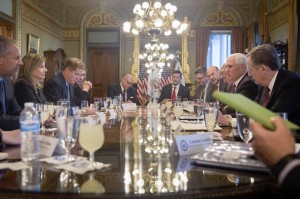
U.S. Trade Representative Robert Lighthizer complained that officials from Mexico and Canada are unwilling to budge on issues important to the U.S.
With the three-way discussions about change NAFTA stalled on key issues, the auto industry – and the North American economy generally – could be in for a bone-jarring shock if the talks failed.
The concern was evident Monday when key executives from General Motors, Ford Motor Co. and Fiat Chrysler Automobiles N.V., came to Washington D.C, for a meeting on trade and manufacturing policy with Vice President Mike Pence, who often serves as the Trump administration’s emissary to business.
GM, Ford and FCA have all come to rely on a North American wide production base, which developed under NAFTA, to compete with carmakers from Asia and Europe. Automakers have been lobbying the administration to abandon proposals that would require more parts for automobiles be made in one of the three countries so as to avoid hefty tariffs.
“We view the modernization of NAFTA as an important opportunity to update the 23-year-old agreement and set the stage for an expansion of U.S. auto exports,” Matt Blunt, president of the American Automotive Policy Council, said after the meeting.
Lighthizer said after the fifth round of NAFTA talks officially closed last week insisted that Canada and Mexico need to be more flexible on key issues, including revisions in the rules of origin provision for automobiles sold duty-free in the U.S.
“Thus far, we have seen no evidence that Canada or Mexico are willing to seriously engage on provisions that will lead to a rebalanced agreement,” he said.
The impasse, however, has prompted analysts to speculate that the NAFTA could come apart in the months to come.
“Particularly given the US negotiators’ actions in the past week, and the US and Canadian response, we now see the probability of a collapse in talks and the end of NAFTA in 2018 as reasonably high, at around 30%. This would almost certainly occur as a result of US (rather than Canadian or Mexican) notification to withdraw,” according to BMI Research, which tracks developments in the global auto industry.
(Click Here for details about Trump’s warning against NAFTA talks.)
BMI said within this 30% comes various subsets of scenarios, including the development of a zombie NAFTA that lives on in name only. ”Finally, the odds of an agreement being reached by the end of March 2018 are shrinking, and we see a roughly 20% probability that further talks will take the renegotiation well past mid-2018,” BMI said.
“The latter possibility does not necessarily make a final agreement more likely, however, due to potential shifts in leadership in Mexico and the U.S. Congress that may be less trade-friendly, and the increasing amount of time that Canada and Mexico have to make trade deals on the side to diversify their export markets and import sources.
“In other words, the chances of success, the chances of NAFTA’s survival in a form resembling the status quo are probably less than 50/50.”
Meanwhile, a new report from the Bank of Montreal said that terminating the NAFTA would harm the U.S. and Canadian economies and reduce their competitiveness versus Asia and European.
(To see more about the recent round of NAFTA talks, Click Here.)
The study said the United States, Canada and Mexico impasse would lead to a 0.2% net reduction in real U.S. gross domestic product during the next five years, and a 1% decrease for Canada’s economy.

